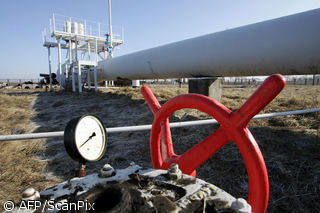The Russian Gas monopoly Gazprom intends to take action in order to force The Ukraine to pay for gas and stop the country from exporting it to Europe.
Published:
7 July 2000 y., Friday
Russian deputy Prime Minister Viktor Khristenko has reported that gas deals between the two CIS members are to be radically revised and a new payment procedure is to be introduced soon. By October 1st this year, the Russian government will have prepared a set of documents regulating gas transactions between the two states. Judging from the published excerpts from those documents, Russia will no longer tolerate The Ukraine’s non-payment and gas theft.
Firstly, to stop gas deliveries through The Ukraine would mean loosing lucrative contracts with Germany. Secondly, Kiev has cunningly managed to use Gazprom’s and the Russian authorities’ interests to suit its own ends, by promising the Kremlin that The Ukraine could delay its bid to enter NATO. The Russian authorities willingly bought these promises.
Politics aside, there were also economic reasons for Russia’s lenience towards The Ukraine. Gazprom has always acted as a private legal entity, although the Russian government holds a 41% stake in the gas giant. However, Gazprom continuously delayed tax payments, omitted dividends, and state representatives were given a disproportionately low share of the seats on Gazprom’s board of directors.
The government therefore did not take great pains to defend Gazprom’s interests.
Russia also insists that The Ukraine should stop illicit gas deliveries to Europe. The problem is that The Ukraine purchases Russian gas on favorable terms, regularly delays payments to Gazprom and then resells gas at high European prices, thus disrupting the stability of European gas supplies.
Šaltinis:
Internet
Copying, publishing, announcing any information from the News.lt portal without written permission of News.lt editorial office is prohibited.
The most popular articles
 One of the biggest Finnish introducing broker companies Finnprinters, connecting customers and printing houses, has started joint business projects with Lithuania’s 2 printing houses.
more »
One of the biggest Finnish introducing broker companies Finnprinters, connecting customers and printing houses, has started joint business projects with Lithuania’s 2 printing houses.
more »
 Statistics Lithuania informs that, based on the Labour Force Survey (LFS) data, the unemployment rate in I quarter 2009 reached 11.9 per cent, i.e. was close to the level of the year 2004. Over a quarter, the unemployment rate grew 1.5 times, over a year – 2.4 times.
more »
Statistics Lithuania informs that, based on the Labour Force Survey (LFS) data, the unemployment rate in I quarter 2009 reached 11.9 per cent, i.e. was close to the level of the year 2004. Over a quarter, the unemployment rate grew 1.5 times, over a year – 2.4 times.
more »
 Lithuania’s Acting Minister of Foreign Affairs Vygaudas Ušackas discussed ways of accelerating the implementation of Rail Baltica in the current economic environment and attracting foreign investments for the implementation of this project.
more »
Lithuania’s Acting Minister of Foreign Affairs Vygaudas Ušackas discussed ways of accelerating the implementation of Rail Baltica in the current economic environment and attracting foreign investments for the implementation of this project.
more »
 Proposals for transparency and monitoring to keep gas flowing to the EU.
more »
Proposals for transparency and monitoring to keep gas flowing to the EU.
more »
 On a day in which G8 leaders in Italy said the world economy still faces "significant risks," a top White House official said the Obama administration is not discussing a second stimulus plan.
more »
On a day in which G8 leaders in Italy said the world economy still faces "significant risks," a top White House official said the Obama administration is not discussing a second stimulus plan.
more »
 EU proposes microfinance facility to encourage the unemployed to start their own businesses.
more »
EU proposes microfinance facility to encourage the unemployed to start their own businesses.
more »
 For those of you who like your fruit and vegetables to look as crooked, knobbly and curvy as possible 1 July was a good day.
more »
For those of you who like your fruit and vegetables to look as crooked, knobbly and curvy as possible 1 July was a good day.
more »
 Walt Disney will invest almost half a billion U.S. dollars into its Hong Kong Disneyland, to bolster the park's prospects against a planned rival in Shanghai.
more »
Walt Disney will invest almost half a billion U.S. dollars into its Hong Kong Disneyland, to bolster the park's prospects against a planned rival in Shanghai.
more »
 On 26 June 2009 Securities Commission (SC) approved the merge of investment funds controlled by UAB SNORAS Asset Management with SNORAS Global Equity Funds of Funds (SGEFF) by joining JT Baltic Equity Fund I.
more »
On 26 June 2009 Securities Commission (SC) approved the merge of investment funds controlled by UAB SNORAS Asset Management with SNORAS Global Equity Funds of Funds (SGEFF) by joining JT Baltic Equity Fund I.
more »
 Taking into account changes on international and domestic money markets AB DnB NORD Bankas, a member of international financial group, has changed time deposit rates for individual customers.
more »
Taking into account changes on international and domestic money markets AB DnB NORD Bankas, a member of international financial group, has changed time deposit rates for individual customers.
more »